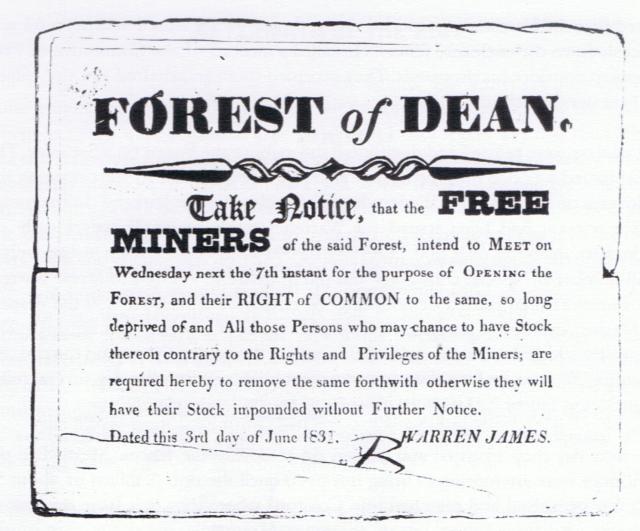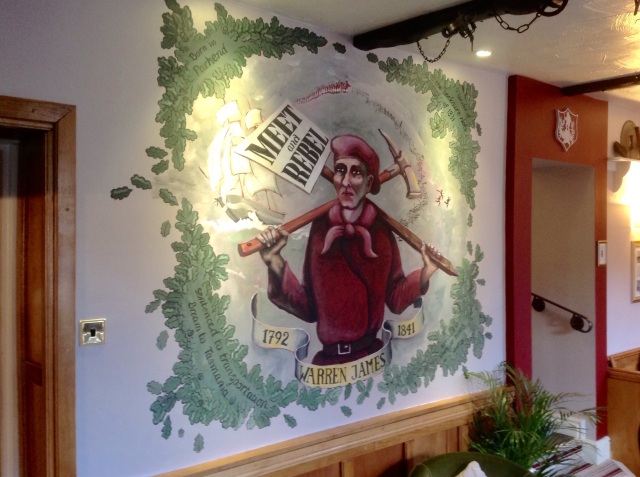
Public Notice attributed to Warren James, leader of the Forest of Dean Rioters Wikimedia Commons (Public Domain)
In an earlier post on this blog we looked at the celebrated ‘Charter of the Forest’, described by the organizers of ‘The New Putney Debates‘ as ‘a companion document to the better-known Magna Carta’, first enacted in November 2017, and a major influence upon the Digger and Leveller Movements of the seventeenth century. The principal aim of the Charter of the Forest was to provide protection for the ancient rights of forest Commoners, a class of persons allowed by statute to obtain at least a portion of their livelihood from common land and communal tracts of woodland and forest. Although most of this class of freemen have long since died out in most parts of England, in a number of key locations, most notably the New Forest and the Forest of Dean, ancient Commoners Rights are still extant, and include a wide variety of activities principally aimed at preserving the environmental and cultural integrity of the local Commons.
These include the customary Beating of the Bounds, an ancient, and at one time universal, traditional custom which in many parts of England was used not only to collectively delineate the old parish boundaries, but also as a ritual means of acquiring continued access to Common Land. In many parts of England this custom has proven origins that date before the Norman Conquest, so it may come as no surprise that the inheritors of the Franco-Norman Ascendancy that had effectively established the Medieval Feudal System that prevailed in England under the Normans, the Plantagenets and their successors, were to engage in constant and ever more elaborate attempts to deprive the Common People of their rights of access to these ancient commons as the centuries progressed. A situation that has continued until this day. The principal legal code in which much of this Custom Law and Common Right appears to have been brought together and codified before the establishment of what was generally referred to as ‘The Norman Yoke’ by seventeenth century Radicals such as the Diggers and the Levellers, who sought to strengthen and redefine many of these ancient freedoms and entitlements, were the Ancient Laws of Winchester; sometimes referred to as ‘Cnut’s Winchester Code’.
Although many of these ancient rights had been effectively reestablished after the English Civil War, during the Commonwealth or Parliamentary Interregnuum, by the beginning of the nineteenth century there was a large scale attempt being made by the well to do and landed classes, helped by their friends in Parliament, to do away with them once and for all. This in turn had led to wholesale social unrest in many parts of the country, and riots ensued in the Forest of Dean following the passing of the Dean Forest Timber Act (1808). Much of the subsequent fencing off of some 11,000 acres (4,500 ha) of woodland which had been set aside for enclosure under the Act appears to have become subject to the new measures in the immediate aftermath of the Napoleonic Wars, at a time of great economic hardship and austerity for many ordinary people; and this may have been a major contributor to the violence and rioting that would subsequently ensue.
Perhaps the best known participant in the Forest of Dean Riots was their self styled ringleader Warren James, whose principal claim to fame was perhaps his conviction and subsequent transportation to Australia in 1831/2. By stark contrast, Thomas Willingale, who was himself involved in a more subtle method of passive resistance rooted in the ancient Traditional Custom of ‘Lopping’, as a means of preserving the rights of the Essex Commoners, with particular reference to the ancient traditions of Custom Law and Common Right in and around his native Epping Forest, successfully escaped arrest and the trauma of a criminal trial by employing his wits instead of his fists, thereby outmaneuvering the machinations and guile of local landowner William Whitaker Maitland. In doing so he was to gain the support of the Buxtons of Warlies and Knighton, themselves prominent local gentry with links to the Commons Preservation Society, along with John T. Bedford, a key member of the City of London Corporation. This was to result in the Epping Forest Act of 1878, which has preserved the unenclosed parts of the Forest as publicly accessible recreational open space, and with it the memory of Thomas Willingale, whose own anniversary years of 1799 (birth) and 1870 (death) fell last year’s New Year’s Eve and this year’s New Year’s Day respectively, down to the present day.
Interestingly enough, England was not the only European country where such widespread enclosures were taking place. As the journalist and broadcaster Stephanie Flanders has pointed out in her 2012 Open University documentary about the life and work of Karl Marx for the BBC, similar developments in Germany were to inspire the development of the founder of Marxism’s own political thinking. Indeed, some of the young Karl Marx’s earliest cotributions to the ‘Rheinische Zeitung‘ involved critical essays focusing on what he saw as the failings of the Rhineland Diet, at that time seated at Düsseldorf, to deal with the erosion of what had previously been similar examples of Custom Law and Common Right which had prevailed since the establishment of the Holy Roman Empire, and in some cases even before, in favour of the landed classses.

‘Stylised mural of Warren James (1792-1841). Painted by Tom Cousins at The Fountain Inn, Parkend, Forest of Dean, Gloucestershire’ (photo credit and caption Obscurasky – Own work Wikimedia Commons licence
